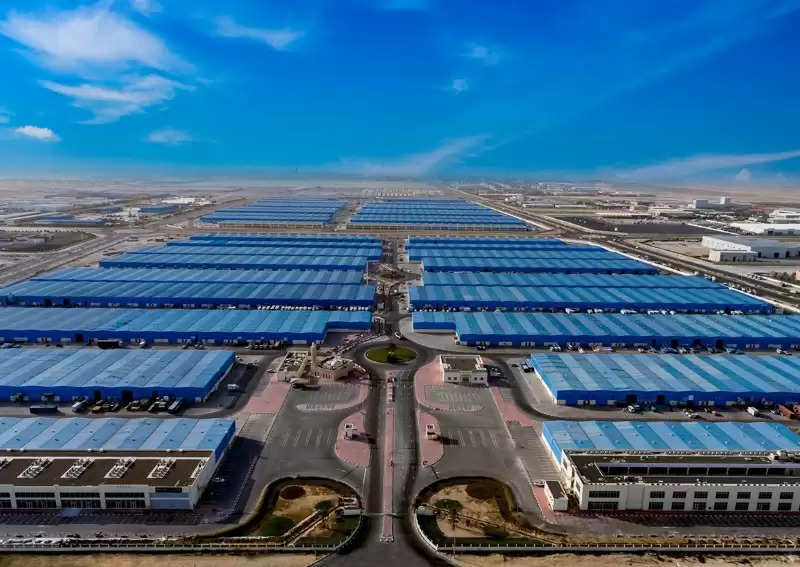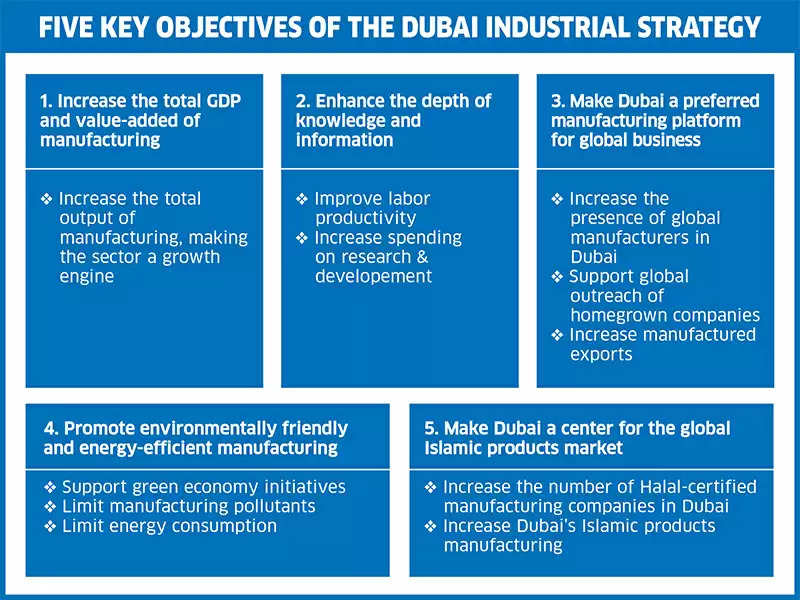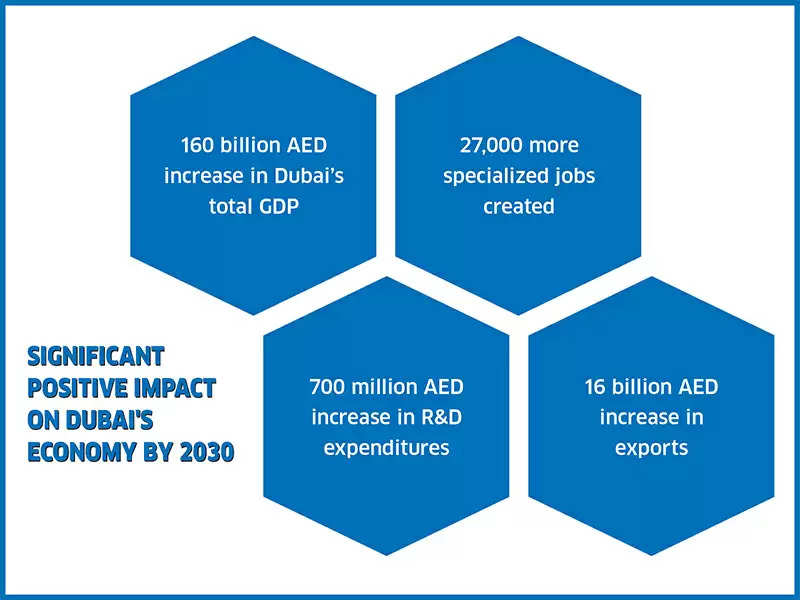Dubai seeks to become industrial hub in line with Dubai Industrial Strategy 2030 vision

Dubai is scaling up efforts to transform itself into a global industrial and manufacturing hub and attract major investments across key sectors such as aerospace, pharma and medical equipment, and more. This is consistent with the Dubai Industrial Strategy 2030, which projects an additional $5 billion in industrial sector growth by the year 2030.

In the past 10 years, the contribution of Dubai’s industrial sector to its GDP has been around 11-14%, making it the third largest sector, after trade and logistics. It has continued to demonstrate solid growth even during times of global crisis, buoyed by a range of strategic government initiatives and programs, such as the Dubai Industrial Strategy, to boost the global competitiveness of the sector and attract foreign investments.
"The Dubai Industrial Strategy aims to leverage our advanced infrastructure, enabling an environment to transform the UAE into a global platform for innovative industries and a destination of choice for international companies seeking an integrated and favorable environment for growth and sustainability,” said His Highness Sheikh Mohammed Bin Rashid Al Maktoum, Vice-President & Prime Minister of the UAE and Ruler of Dubai.
Global as well as Indian companies, including India’s Himalaya Wellness, have built manufacturing facilities and research and development centers in Dubai – a move that is in line with the Emirate’s industrial strategy to boost ‘Make in UAE’ production in key sectors, including pharmaceuticals and medical products.
“Himalaya invests in markets with an in-depth and long-term approach, maintaining high ethical standards at each step of the way. Dubai’s highly supportive and business-friendly environment, efficient administration and forward-looking immigration policies backed by excellent work–life balance were some of the factors that inspired us to open a global R&D Centre here. Dubai being a gateway to the world will continue to be a strong pillar for Himalaya’s global outreach,” said Shailendra Malhotra, Global CEO, Himalaya Wellness.
Himalaya Wellness, which is a global manufacturer of pharmaceuticals, herbal, and personal care products, signed an agreement to build a 120-million-dirham herbal pharmaceutical factory in Dubai Industrial City, one of the largest manufacturing hubs in the region, with the commercial production of the plant set to begin in the first quarter of 2024.
“As one of the region’s largest industrial hubs, Dubai Industrial City takes pride in providing a platform where businesses from around the world can expand and benefit from a favorable business climate, world-class infrastructure, and unrivalled connectivity. Our community is home to giants like Al Barakah Dates, Standard Carpets, and Anorka Food Industries and OSE Industries, all of which are exporting across the region and to the US, Europe, Africa, and Australia,” said Saud Abu Alshawareb, Executive Vice President – Industrial Leasing, TECOM Group, and Managing Director of Dubai Industrial City.
Established in 2004, Dubai Industrial City is home to more than 750 businesses and hundreds of advanced factories using fourth industrial revolution technologies to make everything from car parts to coffee. Its ease of doing business, advanced infrastructure, logistics network, availability of raw and packaging materials, and access to specialized talent have cemented Dubai’s position as a preferred manufacturing, industrial, and R&D hub.
“The world’s largest companies have chosen Dubai to expand their reach and impact, reflecting the vast opportunities in the region that the emirate offers access to. Dubai’s expanding business community has created a rich pool of knowledge and innovation that will further raise its contributions to global R&D,” said Abdulla Belhoul, CEO, TECOM Group.
The Dubai Industrial Strategy 2030, which was launched in June 2016 with the goal of elevating the Emirates into a global platform for knowledge-based, sustainable, and innovation-focused businesses, has identified 75 initiatives to transform Dubai into an industrial hub.

The strategy has further identified six priority sub-sectors:
- Aerospace: By manufacturing parts for aircraft and providing aircraft services, Dubai can leverage its position as a global hub for aviation. Emirates Airlines is considered to be one of the leading airlines in the world, and the strategy aims at supporting Emirates Airlines through the localization of manufacturing capabilities and increasing levels of research and development in the sector.
- Maritime: Due to Dry Docks World and Dubai Maritime City, the Emirate is considered a front-runner in the field of maritime maintenance and repair. DP World is considered one of the largest port operators in the World. Dubai is perfectly positioned as a hub for trade and maritime services. The strategy will seek to broaden its activities as the magnitude and scale of sea traffic grows.
- Pharmaceuticals and Medical Equipment: Pharmaceuticals and medical equipment is a vital sector for any economy. Lucrative opportunities exist to develop this sector. Many international firms have expressed their interest in moving plants and research centers abroad to take advantage of new markets and lowered business costs. Dubai is considered as one of the prime hubs to host these international firms. Increasing investments in R&D, infrastructure and building capacity help step up to the next phase of manufacturing pharmaceuticals which requires advanced technology, skilled human capital and strong R&D capabilities.
- Aluminum and Fabricated Metals: Dubai is one of the largest producers of fabricated metals (especially aluminum) worldwide. The UAE is one of the top global producers of aluminum. The industrial strategy will aim to expand its production capacity of fabricated metals. This will be achieved by enhancing the capabilities of the downstream and finished goods manufacturing domains to increase the overall added value and maximize benefits from the existing smelters.
- Food and Beverages: With countries in the Gulf Cooperation Council (GCC) importing 70 per cent of their food needs and registering an annual growth of more than 3 per cent, Dubai can play a significant role in becoming a major hub for food products in the region. Dubai’s logistical capabilities will serve as a driver for F&B escort. The growing demand for Halal products is also poised to cement Dubai’s position as the capital of the Islamic economy and enhance local manufacturing.
- Machinery and Equipment: The machinery and equipment sector represents 25% of the overall industrial sector in Dubai, making it one of the largest industrial sub-sectors in Dubai. Efforts to develop this sector and boost its global competitiveness are expected continue to add a significant amount of value to Dubai’s overall GDP, given the investment opportunities and strong demand.

With the Dubai Industrial Strategy and focused government initiatives to make Dubai a global industrial and manufacturing hub, the UAE is taking one more step towards building a future-ready economy and becoming a preferred destination for investors and businesses from across the world.
Disclaimer: This article is a part of featured content series on Business in Dubai

